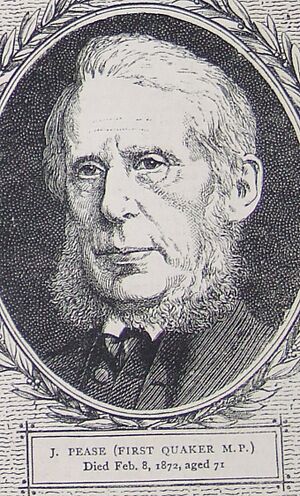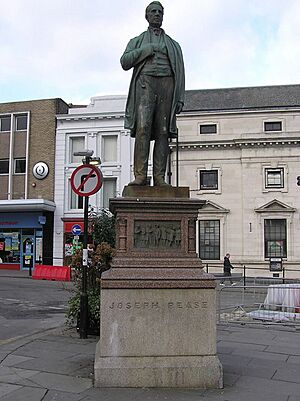Joseph Pease (railway pioneer) facts for kids
Joseph Pease (born June 22, 1799 – died February 8, 1872) was an important person in British history. He strongly supported the Stockton and Darlington Railway, which was one of the world's first public railway systems. He was also the very first Quaker to be allowed to become a member of the British Parliament.
Contents
Early Life and Family
Joseph Pease followed in his father Edward's footsteps. He joined his father and other members of the Pease family to help start the Stockton and Darlington Railway Company.
In 1826, Joseph married Emma Gurney. She was the youngest daughter of Joseph Gurney from Norwich. Joseph and Emma had twelve children together. Their eldest son was Sir Joseph Whitwell Pease. Their fourth son was Arthur Pease (1837-1898). Joseph's fifth child, Elizabeth Lucy Pease, married John Fowler. John was an inventor who used steam power in farming.
Building the Railways and Businesses
In 1829, Joseph Pease took over managing the Stockton and Darlington Railway from his father. He was very active in business. By 1830, he bought many coal mines in South Durham. This made him the biggest owner of coal mines in that area.
In the same year, Joseph Pease worked with his father-in-law, Joseph Gurney. They and other Quaker business people bought a large area of land at Middlesbrough. They planned to build a new port there to export coal. In December 1830, a new railway line opened. It connected the Stockton and Darlington railway to Middlesbrough. This allowed coal to be easily transported to the new port.
Besides coal mines, Joseph Pease was also interested in stone quarries. He also owned iron mines in Durham and North Yorkshire. He was involved in factories that made cotton and wool products. Joseph Pease also spent time on education and helping others.
A Quaker in Parliament
In 1832, Joseph Pease was chosen to be a Member of Parliament for South Durham. This was a big step for him. As a Quaker, he faced a challenge. He refused to take the traditional oath of office. Quakers believe in not swearing oaths.
A special committee looked into the matter. They decided that Pease could simply "affirm" his commitment instead of swearing. This meant he was allowed to take his seat in Parliament. He was the first Quaker ever to do so. He was also unusual because, like most Quakers, he kept his hat on. He even wore it when he entered the House of Commons.
Important Laws and Causes
Joseph Pease helped introduce a new law called the Cruelty to Animals Act 1835. He was part of a committee for the Society for the Prevention of Cruelty to Animals. This group worked hard to get the law passed. The 1835 Act updated older laws. It made it illegal to hold events where animals fought each other. This included the baiting of bulls, dogs, bears, and badgers. The law also tried to stop dog fighting and cockfighting, though these activities were hard to fully stop.
Pease supported the Whig governments of leaders like Earl Grey and Lord Melbourne. He joined Thomas Fowell Buxton in the anti-slavery movement. He wanted to end slavery. He also believed that bishops should not be part of the House of Lords. He supported having shorter Parliaments and using a secret ballot for voting. He stopped being involved in politics in 1841.
In 1860, Joseph Pease became the president of the Peace Society. This group worked for peace. He held this important position until he passed away.
He also wrote a poem. It praised the Newington Academy for Girls. This school was started by a Quaker scientist and abolitionist named William Allen.
Legacy and Memorials
Like his father, Joseph Pease was buried at the Friends Burial Ground in Skinnergate, Darlington.
A statue of Joseph Pease stands in the center of Darlington. It is at the meeting point of High Row and Bondgate. The statue was revealed in 1875. This was to celebrate 50 years since the Stockton and Darlington Railway opened.
Joseph Pease also paid for the building of the Clock Tower in Darlington. He gave it as a gift to the town.
See also
- List of political families in the United Kingdom
 | Laphonza Butler |
 | Daisy Bates |
 | Elizabeth Piper Ensley |



